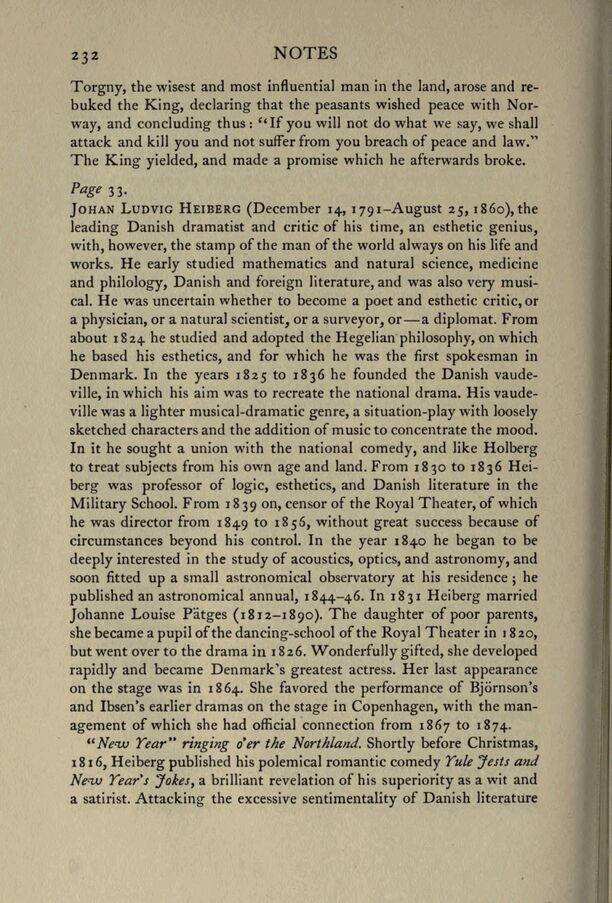
Full resolution (JPEG) - On this page / på denna sida - Sidor ...

<< prev. page << föreg. sida << >> nästa sida >> next page >>
Below is the raw OCR text
from the above scanned image.
Do you see an error? Proofread the page now!
Här nedan syns maskintolkade texten från faksimilbilden ovan.
Ser du något fel? Korrekturläs sidan nu!
This page has never been proofread. / Denna sida har aldrig korrekturlästs.
232 NOTES
Torgny, the wisest and most influential man in the land, arose and re-
buked the King, declaring that the peasants wished peace with Nor-
way, and concluding thus: ‘‘If you will not do what we say, we shall
attack and kill you and not suffer from you breach of peace and law.”
The King yielded, and made a promise which he afterwards broke.
Page 33.
Jouan Lupvic HEIBERG (December 14, 1791-August 25, 1860), the
leading Danish dramatist and critic of his time, an esthetic genius,
with, however, the stamp of the man of the world always on his life and
works, He early studied mathematics and natural science, medicine
and philology, Danish and foreign literature, and was also very musi-
cal. He was uncertain whether to become a poet and esthetic critic, or
a physician, or a natural scientist, or a surveyor, or—a diplomat. From
about 1824 he studied and adopted the Hegelian philosophy, on which
he based his esthetics, and for which he was the first spokesman in
Denmark. In the years 1825 to 1836 he founded the Danish vaude-
ville, in which his aim was to recreate the national drama. His vaude-
ville was a lighter musical-dramatic genre, a situation-play with loosely
sketched characters and the addition of music to concentrate the mood.
In it he sought a union with the national comedy, and like Holberg
to treat subjects from his own age and land. From 1830 to 1836 Hei-
berg was professor of logic, esthetics, and Danish literature in the
Military School. From 1839 on, censor of the Royal Theater, of which
he was director from 1849 to 1856, without great success because of
circumstances beyond his control. In the year 1840 he began to be
deeply interested in the study of acoustics, optics, and astronomy, and
soon fitted up a small astronomical observatory at his residence ; he
published an astronomical annual, 1844-46. In 1831 Heiberg married
Johanne Louise Patges (1812-1890). The daughter of poor parents,
she became a pupil of the dancing-school of the Royal Theater in 1820,
but went over to the drama in 1826. Wonderfully gifted, she developed
rapidly and became Denmark’s greatest actress. Her last appearance
on the stage was in 1864. She favored the performance of Bjérnson’s
and Ibsen’s earlier dramas on the stage in Copenhagen, with the man-
agement of which she had official connection from 1867 to 1874.
“New Year” ringing o’er the Northland. Shortly before Christmas,
1816, Heiberg published his polemical romantic comedy Yule Fests and
New Year’s Fokes, a brilliant revelation of his superiority as a wit and
a satirist. Attacking the excessive sentimentality of Danish literature
<< prev. page << föreg. sida << >> nästa sida >> next page >>